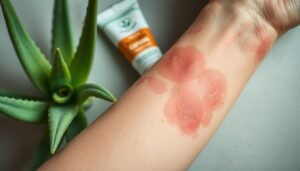Eczema is a chronic skin condition that affects millions worldwide, characterized by red, itchy, and inflamed skin. One of the most common questions people with eczema have is: Does eczema go away on its own? Understanding the duration of eczema and how it can be managed is crucial for those dealing with this persistent skin issue.

Does Eczema Go Away on Its Own?
Eczema, particularly atopic dermatitis (the most common form), can improve or even disappear as children grow older. Many children experience a reduction in symptoms by adolescence or early adulthood. However, for others, eczema may persist into adulthood, requiring ongoing management. The condition’s duration and resolution depend on various factors, including genetics, immune system responses, and environmental triggers.
While some individuals experience temporary relief without treatment, others may face ongoing flare-ups. It’s essential to collaborate with healthcare providers to create a personalized treatment plan based on specific needs and triggers.
How Long Do Eczema Flare-Ups Typically Last?
The length of eczema flare-ups varies from person to person. Flare-ups are characterized by red, inflamed, and itchy skin and can last anywhere from a few days to several weeks.
Key factors influencing the duration include:
- Management and treatment: Flare-ups tend to be shorter if triggers are identified and addressed promptly.
- Type of eczema: For example, contact dermatitis may resolve quickly once the irritant is removed, while atopic dermatitis can persist longer and may require more intensive treatment.
Common triggers include stress, food allergies (like dairy or gluten), environmental factors (such as pollen), and harsh soaps. Identifying and avoiding these triggers is essential for minimizing the duration of flare-ups.

What Are the Different Stages of Eczema?
Eczema presents in various stages, and understanding these stages can help in its management. The stages are usually classified based on symptom severity:
- Initial Stage: Dry, itchy skin with mild redness and occasional bumps. Flare-ups are often intermittent and triggered by environmental or emotional stressors.
- Subacute Stage: Symptoms become more persistent, with increased redness, scaling, and thickening due to constant scratching. Discomfort may intensify.
- Chronic Stage: The skin becomes lichenified, meaning it develops thick, leathery patches due to prolonged itching and scratching. At this stage, eczema can significantly affect quality of life.
Proactive skincare and treatments are vital for preventing eczema from progressing to these more severe stages.
Prevention of Flare-Ups
Preventing eczema flare-ups is key to managing the condition effectively. Here are several strategies to reduce the frequency and severity of outbreaks:
- Identify and avoid triggers: Common triggers include specific fabrics (like wool), harsh soaps, extreme temperatures, stress, and certain foods.
- Maintain skin hydration: Regular use of emollients and moisturizers strengthens the skin’s barrier, reducing irritation and inflammation. Applying moisturizers right after a bath helps lock in moisture.
- Use fragrance-free and hypoallergenic products: These products reduce exposure to potential allergens that can trigger eczema.
- Healthy lifestyle choices: A balanced diet, stress management techniques (like yoga or meditation), and adequate sleep all contribute to overall skin health.
By adopting a proactive approach, individuals with eczema can significantly reduce flare-ups and improve skin health.
Causes of Itchy, Red Skin That Happens With Eczema
Several factors contribute to the itchy, red skin that defines eczema flare-ups:
- Genetics: A family history of eczema or allergic conditions increases the risk of developing eczema. Genetic factors can cause the skin barrier to malfunction, making it more susceptible to irritants and allergens.
- Environmental Factors: Exposure to harsh chemicals (detergents, soaps), temperature changes, and humidity can strip the skin of natural oils and irritate it.
- Allergens: Pollen, pet dander, dust mites, and certain foods can trigger immune responses in people with eczema, leading to skin irritation.
- Stress: Emotional stress can worsen eczema symptoms by increasing inflammation and weakening the immune system.
Managing these triggers through lifestyle adjustments, medication, and environmental control can help reduce flare-ups.
Is There a Cure for Eczema, or Will I Have This Skin Condition Forever?
Currently, there is no definitive cure for eczema, but there are various treatments available that help manage the condition. The goal of eczema treatment is to control symptoms and minimize flare-ups, not necessarily to “cure” the disease.
Effective treatments may include:
- Topical corticosteroids to reduce inflammation
- Moisturizers to maintain skin hydration
- Antihistamines to control itching
- Phototherapy for more severe cases
Emerging treatments, such as biologics, show promising results for severe cases that don’t respond to traditional treatments. Ongoing research is focused on understanding eczema better and developing more targeted therapies, bringing hope for improved management and possibly a cure in the future.
A Final Word on Managing Eczema in the Long Term
Managing eczema requires a long-term commitment to both prevention and treatment. Here’s a quick recap of key strategies:
- Skincare routines: Use gentle, fragrance-free cleansers and moisturizers to prevent dryness, a common eczema trigger.
- Stress management: Incorporate relaxation techniques such as meditation or deep breathing exercises to reduce stress-related flare-ups.
- Personalized treatment plans: Work with healthcare providers to develop a plan tailored to your needs. This may involve topical treatments or oral medications during flare-ups.
- Regular check-ups: Dermatologists and allergists can help monitor eczema and adjust treatments as necessary.
By adopting these proactive measures, individuals with eczema can manage the condition more effectively, improve their quality of life, and reduce the frequency of flare-ups.
Conclusion
Eczema is a chronic condition with no fixed timeline for resolution. While some may experience symptom improvement with age, others may need ongoing management. By working closely with healthcare providers, identifying triggers, maintaining proper hydration, and practicing stress management, individuals can take control of their eczema journey.
While living with eczema can be challenging, staying informed, proactive, and resilient can lead to better management and a brighter future. With continued medical research and treatment advancements, individuals with eczema have hope for improved outcomes in the years to come.